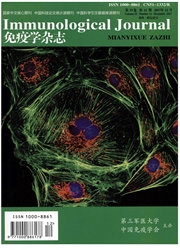

 中文摘要:
中文摘要:
目的通过研究雌二醇(E2)、孕酮(P4)对小鼠同种异基因移植物存活时间的影响,探讨妊娠期间母体外周血中雌、孕激素水平对母体免疫应答能力以及对母胎免疫耐受的影响。方法雌性受体小鼠通过切除双侧卵巢去势,胃饲E2或P4,使外周血E2或P4浓度达到相当于小鼠妊娠中期水平。以腹腔注射CsA的小鼠作为对照,进行耳后同种异基因半心移植,观察各组移植物存活时间,并取移植部位组织进行石蜡切片HE染色。结果同基因移植组心肌长期存活(〉300d),异基因移植对照组心肌平均存活时间为(12.8±0.8)d。与异基因移植对照组比较,CsA组心肌存活时间显著延长(〉20d),P〈0.01;E2组移植心肌存活时间显著缩短(9.7±0.5)d,P〈0.01;P4组心肌存活时间与对照组比较无显著差异,平均(12±0.6)d,P〉0.05。结论妊娠期母体外周血中E2和P4水平对母体的系统性免疫应答无明显抑制作用,不是维持非胎盘部位母胎免疫耐受的主导性因素。
 英文摘要:
英文摘要:
Objective To evaluate the effects of 17β-estradiol (E2) and progesterone (P4) in peripheral blood of the mother on maternal-fetal tolerance and the systemic immune competency during pregnancy by investigating their impacts on survival of the allograft in mice. Methods Female murine recipients were ovariectomized, and E2 or P4 were orally administered until the E2 or P4 level in peripheral blood reach that of pregnant mouse during the second trimester. Split-heart was transplanted into the ear pinna of the recipients for observing the allograft survival as well as histological changes, with CsA-treated recipients as control. Results The cardiac syngraft gained long-term survival (〉 300 days). Survival of the cardiac allograft in untreated reci-pients was (12.8±0.8) days, prolonged to over 20 days in CsA treated recipients (P 〈 0.01), shortened to (9.7±0.5) days in E2 group (P 〈 0.01), and made no significant difference in P4 group (P 〉 0.05). Conclusion The E2 and P4 in mother blood during pregnancy are not the major factors responsible for non-placental maternal-fetal tolerance, and have no inhibitory effects on the systemic immune response of the mother.
 同期刊论文项目
同期刊论文项目
 同项目期刊论文
同项目期刊论文
 期刊信息
期刊信息
